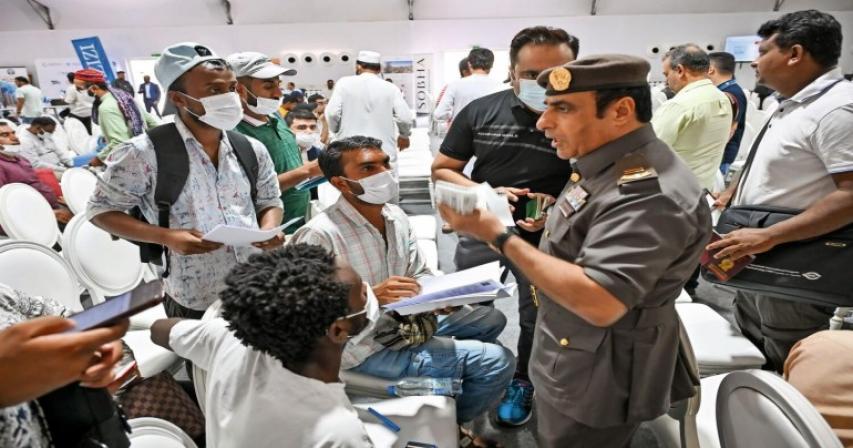Volunteers in Dubai help overstayers navigate amnesty process

‘It has been almost four months now since I’ve arrived at the tent in Al Awir at 8am.’ Second Lt Rashid Naeem Al Khatib is an officer with the General Directorate of Residency and Foreigners Affairs (GDRFA). His work is simple and virtuous — helping overstayers get through regularisation.
Al Khatib has a different role at the GDRFA but, while his job is another department, he takes it all on without any effort.
"According to the process that we have and what they have put in paper, we assist them where we can," said Al Khatib. ‘We’re just here to manage it and do all the support. I have volunteered ever since the amnesty started on 1st September, and I have seen many happy endings and fresh starts.
Recalling an emotional example, Al Khatib added: "There was this man who did not see his kids for many years because they were in his country. He came to the tent scared and depressed. He just wanted to get the procedures over with in order to go home to his family. We got him through the process, gave him an outpass, even made his flight arrangements. When he left in tears of delight, we had tears as well. We could see through his smile that he was happy".
Al Khatib and his volunteer team wake up early and transfer the work to the next group around 3pm. "No case goes unattended," he said.
Working tirelessly for a cause
So have First Sgt Saeed Mohammed Ahmed Salem Al Badwawi and he has been volunteering with overstayers at the GDRFA tent.
Al Badwawi like Al Khatib combines his professional work with volunteerism. ‘We do a lot of that here: we organise, lead and support overstayers,’ he said. "If there is any problem, we refer them to the right people and solve their problems so they are happy.
Dispelling myths, Al Badwawi pointed out that misinformation leads to unnecessary panic among overstayers. He remembered that there was a man standing outside, tired and not knowing whether or not his application would be considered.
"Most of them come after hearing fabricated tales from outside," Al Badwawi said. The candidate had been misled and he was worried about the time frame.
"We took him in, drank water and heard his tale. It was a simple matter and it shouldn’t have taken five minutes or so, but he wasn’t educated. "We issued his exit permit and he was home in few days," Al Badwawi said.
Volunteers said they get overstayers who approach them, who are amazed at how fast the process takes at the tent. "We tell them they should ask for official reports only – GDRFA, ICP, and not outside inaccurate reports," said Al Badwawi.
‘The tent was packed,’ Al Badwawi recalled about the last days before the first deadline of 31 October.
"Once the extension was made public, overstayers had more time and there were fewer of them arriving to regularise status. ...But we never recommend to go on the last minute. "Even before you, come earlier because it’s better for you," said Al Badwawi.
‘The backbone of the amnesty’
Salem Mohammed Ali Sultan Bin Ali, who runs the GDRFA centre in Al Awir, hailed the work of the volunteers, who he called the backbone of the amnesty initiative.
"There are two batches of volunteers," said Bin Ali. "One of them consists of people from the communications departments of other government departments and the other group is the GDRFA staff. "We ask them to help overstayers for 14 days, and they volunteer their time away from their regular work so they can be here full time," she said.
The mix of volunteers has helped to meet the demands of overstayers. "A lot of them are multilingual so it’s a great way to guide overstayers. They explain what documents applicants need, they explain the process and take them to the correct counters. "Many overstayers come here who don’t know what’s happening and the volunteers help them make it less daunting," said Bin Ali.
"The volunteers have been a big help in keeping everything together and out of the way for everyone. They’ve worked tirelessly helping out overstayers and we’re very grateful for them," he said.
Spreading hope
The reward of being able to provide relief to others is something that volunteers are very grateful for. "We are happy with every case that is solved," Al Khatib added. "You want to get people smiling again, that’s why we do it."
The amnesty, which was in place from 1 September, gave overstayers a chance to either resettle or leave the country without deportation. The GDRFA volunteers, whose time on the programme is coming to an end, are still on board to assist as many overstayers as possible.






Comments